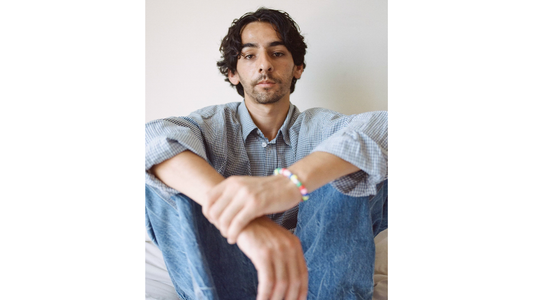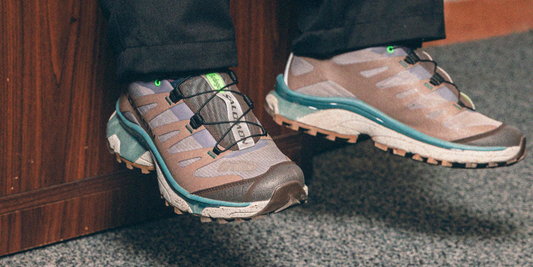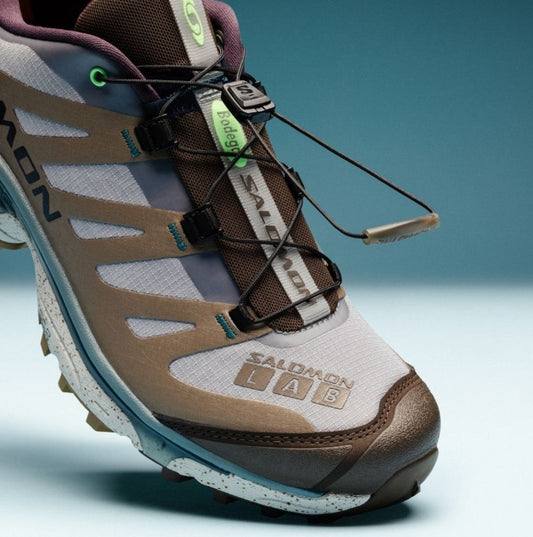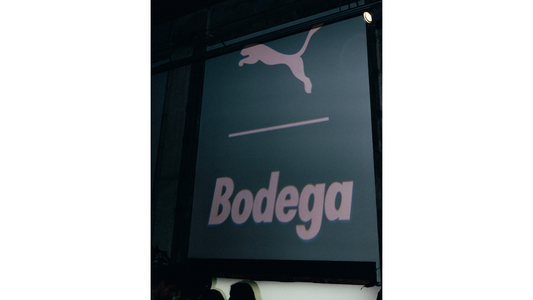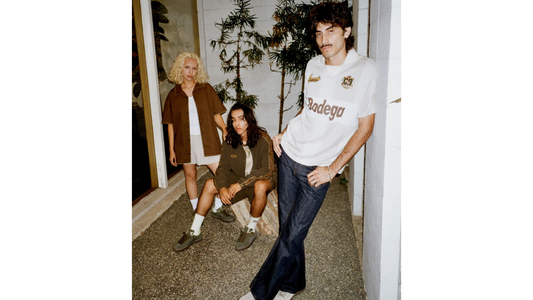Hudson Mohawke is a Scottish electronic music producer, DJ, and composer known for his experimental blend of hip-hop, R&B, and electronic music.
He gained recognition in the mid-2000s and has since collaborated with a range of high-profile artists, including Lil Wayne, Drake, and Pusha T. Throughout his eclectic career, HudMo has released several solo albums, including "Butter" in 2009 and "Lantern" in 2015, both garnering cult followings and critical acclaim.
Read on where we chat with Hudson Mohawke about his early dance and hip-hop influences, the impact of MTV Music Generator for Playstation 1, his love for Balenciaga Arena sneakers, and more.
Q+A
Bodega:
So to start, just to inform our audience who may not know your history, how did you get your start with music? Like what was your first introduction as a kid?
HM:
So basically, I think I started recording stuff off the radio when I was 7, 8, 9 years old, something like that. I was just making tapes all the time. And it was this period in Scotland and in the UK in general where the predominant big underground music was rave music and drum bass jungle. That was the mid-nineties. And at that point, obviously, I was way too young to go to any of those events and didn’t know anything about the scenes or anything like that. I was just obsessed with the music. And basically, a lot of that type of music stems from samples of rap music or samples of great beats sped up. It's all essentially sped-up samples of other music. And a lot of how that kind of music is mixed. Often there's scratching thrown into it and there are a lot of elements of rap and hip-hop within that kind of dance music. So then I got really into rap and hip-hop off the back of rave music basically. And I was really, really interested in, I mean, I was obsessed with East Coast hip hop.
Bodega:
Oh word.
HM:
Mid to late nineties, early 2000s, all of the Fat Beats, Ruckus, all that type of shit. I was obsessed with that. I was really into turntablism and I used to do the DMC scratch competitions and all that stuff.
Bodega:
Woah never knew that! Love watching old clips from DMC World Championships.
HM:
Yeah, I used to do all that stuff when I was like 15, 16. I was crazy obsessed with all that. Still to this day, my main influences are super-fast dance music, rave, jungle, and then rap and hip hop, basically. And I guess I got into around about 2000ish - this is probably too in depth, but -
Bodega:
No, all good, go on!
HM:
There was a game that came out for the PlayStation, which was a beat-making game. And basically, it wasn't even really a game. It was a piece of music software for the PlayStation.
Bodega:
This sounds incredible, I've never heard of that.
HM:
The first one was called MTV Music Generator. And then this follow-up one was called Music 2000. And it had this feature where you could open your PlayStation and put in a music CD and sample that into your track that you were making basically. And that was the point where you couldn't really make music unless you had thousands of dollars of equipment. And then there was this thing like 'Oh shit, you can do this and you can sample with a $30 video game, essentially'.
Bodega:
It was accessible now, I guess.
HM:
Yeah. It was kind of the start of that whole era. And I guess even at that point, a lot of people didn't even have PCs, you know what I mean? We didn't even have a family PC even.
Bodega:
Right, that was just the norm back then.
HM:
So a PlayStation was the closest thing to a computer that I had. So I just got obsessed with making shit with that. And I know if you actually, a lot of people actually talk about it interviews that weirdly, that was their introduction to making music. Like Dizzee Rascal.
Bodega:
That's funny because a little later, Guitar Hero kinda serves as a similar introduction. Way more of a product than a platform but still.
HM:
There are definitely a lot of parallels there when you're actually seeing visually the elements of a song. You're like, ‘Oh, that's how that whole thing was put together’. There’s this part and this part, and then the drum part and such and such. It's an interesting way of getting things. 'Cause obviously, that was kind of, to some degree pre-internet culture. It was pre, 'figuring out how to do anything immediately by just looking it up on YouTube'. You just kind of had to figure it out.
Bodega:
For sure, lots of trial, error, and feeling around.
HM:
There's a certain charm to that, to not knowing exactly how someone made something, or exactly how something's done. From then on, I was just obsessed with DJing and beat making.
Bodega:
So you mentioned being into Jungle and East Coast rap and Hip hop. Were there specific groups or artists that you wanted to shout out as specific inspirations during those early days? Or was it just this overall at that point?
HM:
At that point, I was a huge Big L fan. Massive. Dilated Peoples was an influence, that album, The Platform, I was just obsessed with that. I think that came out in 2000, and I was just blown away by that. And so many of the tracks had so much scratching on them as well. Fuck. This is the best shit ever. Who else in that point? I mean, the obvious stuff. Basically, anything that was produced by DJ Premier. Anything that was Pete Rock produced too. And I guess this is kind of Midwest I guess, but I was obsessed with Slum Village.
I really have such a great deal of respect for all those guys. They're really good at a very specific thing, and they just love doing that. They're not trying to do anything and everything, they're just like 'This is what I'm going to make'.
Bodega:
No, for sure.
HM:
And obviously, it comes in waves. There are periods where that type of shit is not that popular. But then, you know, look at it now and that style of kind of 'boom bap' hip hop is pretty big again.
Bodega:
Yeah. I mean, that's what happens when artists make stuff unapologetically - it's just what they want to do. It's just like, yeah. This is it. That confidence can be timeless.
So clearly your backgrounds and influences are really eclectic but how would you describe your own sound? And has it evolved over the years?
HM:
Yeah, I mean, I think it definitely has changed over the years to some degree. But I would say that the core kind of elements have remained the same. It's still very influenced by rave music, very influenced by dance music in general. It’s been a while since I've done a rap project or rap production thing, but that is still a big influence, that era of peak Neptunes, Timberland's era. That kind of sound has always been a huge influence on me. 'Cause I was so sonically blown away by those records. But also, I remember at the time, and I would've been a teenager, I remember being like, 'These are weird records. but they're becoming massive pop hits'. But if you just listen to an instrumental by itself, it sounds like some weird experimental art.
That was a big inspiration to me, and it's still a big inspiration to me - the idea that you can make shit that in itself sounds weird, but it can, in a sense be applicable to, or it can be accessible to a more mainstream audience depending on how it's presented. That was always interesting to me. And I think that's what I always loved about Kanye's stuff and that kind of thing. A lot of that shit, you remove him from it, a lot of it is weird as fuck, but it's able to be presented in this fashion that - at least during his peak era - it really fully is in the mainstream, even though it's kind of weird music. It doesn't fit the template of a pop song.
Bodega:
Your work with him is a good example of that.
HM:
Yeah. I think regardless of his behavior and everything, I think just from his creative output, he was a big inspiration to me for a long time before I ever worked with him. And exactly for those reasons that I've mentioned, a lot of this shit is, it shouldn't work in a pop context, but it does. And that's why I think those kinds of artists are actually really important because who in their right mind is going to, at the peak of their commercial success, be like, 'I'm going to make a really weird record that alienates loads of my fans', like a Yeezus or something like that.
Bodega:
Risk it. Yeah.
HM:
Cause if you don't have that, then you just have the same formula of shit that works. You need someone to be like, I'm going to literally risk my career at the peak of it to make some weird shit and still make it work.
Bodega:
And then when you look back on past projects where artists have done that, it's like, oh shit, this is awesome.
HM:
Exactly, exactly. But it is a risk, of course. It doesn't always work, and people don't like to rock the boat, and if you're super successful, why would you change your formula or whatever. But I think from an artistic standpoint, you should be, to some extent, challenging your own standards, as it were.
Bodega:
Yeah. I mean, as we're talking about this, you're a really great example of an artist who does that - someone who is not just sticking to one sound.
HM:
I mean, don't think that's for me to say necessarily, but I appreciate you saying that. I've always had this kind of thing of, well, it's never really made sense to me that - I love listening to loads of different genres, loads of different - why would I then be like, 'Oh, I only want to make one type of thing'.
For me personally, my take has always been like, well, I'm listening to all this different shit and I'm absorbing all this different music from different kinds of scenes and worlds. Why would I then just be like, 'oh, I'm just going to make only techno, or only drum and bass or something like that?'
Bodega:
Before we started recording you mentioned living in LA and growing up in Glasgow, how has where you've been and where you're living influenced your sound?
HM:
I think the places that I have lived in Glasgow and Scotland, in London and in Amsterdam, I think you have this rare combination of people who are obsessively interested in music, but also really love to party. And I think Montreal has that as well. And I think New York certainly has that. Berlin has it. Places where it's encouraged to be really knowledgeable about music and art and fashion. And it's not frowned upon to be really interested in the details of that, but not at the expense of having a good party. So I find it a lot of places you'll get, either, you'll get one where people really love the music, but you go to a club and everybody just standing there. Or you have places where people will be going fucking crazy in a club, but they don't care what the music is at all.
But getting that combination, that was really inspiring to me. That you could be obsessively interested in the music. And also that could also translate to a really fun, lively, energetic party as well. And I think I feel kind of spoiled to have had those experiences. 'Cause they have been very formative to me and I'm very grateful that I've had those experiences.
Bodega:
So you've worked with so many collaborators over the years. Do you have a standard process when working with artists? Or is it different depending on personality, how they like to work, whether you take a front seat, backseat sort of thing?
I always feel like that side of my work is, that's the side where I feel like I'm still learning the most. Because for so long I was just making music in my bedroom by myself. I didn't really have other collaborators and I didn't really have to consider other people's opinions or other, it was just like, 'Do I think it's good or not?' But I definitely don't have a standard approach. I don't really think you can.
So how would you say your composition or process might change when you're working on different mediums, film or TV, or video games like Watch Dogs 2, for example?
HM:
I think it's a bit of a different approach. There's a big exhibit at the Museum of Contemporary Art Rome that I just did all the music for, and it's totally different because it's a collaborative work. You know what I mean? The same with working on the video game stuff, it's similar to what I said before, sort of learning the push and pull of a collaborative process where maybe you don't get to make every single decision. There can be things that you really love that end up not working out, and it's things that you really push for that maybe the other party is not that into. The process is pretty different too because you're considering, you have to take into account the visual aspect of it that already exists. Whereas when I'm working on solo music, I'll be creating a visual aspect of it in my head at the time, but it's different when you're like, there's an already existing kind of visual aspect or something, and you are trying to figure out how to make something that is still you, but works in that universe as well. And so it's a different type of challenge, but it's very satisfying when it works.
Bodega:
So beyond music, in terms of expressing yourself, how important is clothing or personal style and fashion? Any memorable style phases?
HM:
I had a period where it's probably 2011, 12, 13, 14 kind of thing where I was massively into Balenciaga. Remember those fucking Arena sneakers that everyone used to have? All that fucking Raff Simmons stuff and all that.
Bodega:
Haha of course, what turned you onto that stuff?
HM:
I was with a lot of rappers and stuff at the time, but it was also, people didn't know about that shit, you know what I mean? People didn't know what Balenciaga was, in the context that they see it in nowadays.
Bodega:
Yeah. It was much more underground.
HM:
I just would be on Mr. Porter every day just continually getting shit. But I think it was, I eventually kind of came out of that period, but I had things throughout that whole period that I always loved. Always was a huge Para fan. I had a bunch of prints. How I initially found out about him was when I was living in Amsterdam I knew him from record sleeves. He was designing a lot of record sleeves. And I think it was kind of before he was fully doing the brand, but I was always obsessed with this stuff.
Bodega:
His color palette is just so good.
HM:
And I have a bunch of prints, and I always get a bunch of stuff with every drop of theirs. I used to be crazy into ACRONYM stuff and all that as well. Y-3 too.
Bodega:
Are there any pieces that maybe you've had for a long time or that hold really sentimental value?
HM:
When Virgil was doing the Pyrex stuff. I remember him sending a box in the mail and I remember having a conversation with him about it, and he was like, yeah, the idea is we're going to print them on Champion blanks. The concept was ‘they’re printing everything on champion stuff because the idea is essentially these cheap sports brands that everybody is familiar with can actually be considered high-end'. And this was probably 2011 or something.’
Bodega:
Early days!
HM:
I was like, sounds amazing. And then in five years, that's the whole fucking clothing universe, all sports athletic-based shit.
Bodega:
Yep. Screen printing on mesh was suddenly in.
HM:
Exactly. Yeah. But that, I've still got a couple of those hoodies and stuff with the, what was it? Like Caravaggio?
Bodega:
Yeah, right.
To close out. Got one more question for you. For aspiring musicians and producers in this digital kind of age, do you have any advice for getting their stuff out there?
HM:
I think now even more so than ever, you really see that there's no formula to what can become insanely successful. And that I think is very freeing. You know what I mean? There's shit every week that becomes crazy popular that doesn't fit any sort of template of why it should be popular or why, you know what I mean? And I think being aware of that in terms of knowing that you don't have to sound like this producer or this artist, whatever, you don't have to make shit that sounds like that in order to succeed. And I think that it is even way more so now than even 10 years ago. It's just, it's a total free for all as far as what has a chance of becoming really successful.
So I think it's really just making sure that you are making shit that makes you happy and satisfied. Because if you are chasing the sound of something that's already big or something that's existing, especially nowadays, there's even less of a chance of that becoming successful than even five, 10 years ago. So I think your best bet is making shit that you truly fuck with and believe in yourself because that's your best weapon, I think, is having shit that you personally really fuck with, not having shit that sounds like something else that's big.
Bodega:
Yeah. The intentions have to be there.
HM:
Yeah. Right. Exactly. Exactly. There's no fucking rhyme or reason to why this or that connects, you know what I mean? And I think that in itself is exciting, you know what I mean? It's intimidating if your whole shit is making shit that sounds like this or sounds like, you know what I mean? But if your shit is just doing you, then it's great. You know what I mean? Then I think you have a greater chance of succeeding by just making shit that you really fuck with.


